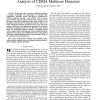Free Online Productivity Tools
i2Speak
i2Symbol
i2OCR
iTex2Img
iWeb2Print
iWeb2Shot
i2Type
iPdf2Split
iPdf2Merge
i2Bopomofo
i2Arabic
i2Style
i2Image
i2PDF
iLatex2Rtf
Sci2ools
TIT
2002
2002
A statistical-mechanics approach to large-system analysis of CDMA multiuser detectors
We present a theory, based on statistical mechanics, to evaluate analytically the performance of uncoded, fully synchronous, randomly spread code-division multiple-access (CDMA) multiuser detectors with additive white Gaussian noise (AWGN) channel, under perfect power control, and in the large-system limit. Application of the replica method, a tool developed in the literature of statistical mechanics, allows us to derive analytical expressions for the bit-error rate, as well as the multiuser efficiency, of the individually optimum (IO) and jointly optimum (JO) multiuser detectors over the whole range of noise levels. The information-theoretic capacity of randomly spread CDMA channel and the performance of decorrelating and linear minimum mean-square error (MMSE) detectors are also derived in the same replica formulation, thereby demonstrating validity of the statistical-mechanical approach.
| Added | 23 Dec 2010 |
| Updated | 23 Dec 2010 |
| Type | Journal |
| Year | 2002 |
| Where | TIT |
| Authors | Toshiyuki Tanaka |
Comments (0)

